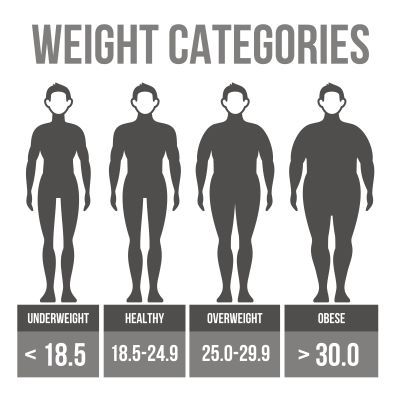BMI stands for Body Mass Index
Body Mass Index (BMI) is the calculation of body weight in relation to height. It’s used to indicate whether a  person is underweight, overweight, obese, or at a healthy weight for his or her height.
person is underweight, overweight, obese, or at a healthy weight for his or her height.
BMI isn’t as accurate as methods that directly measure body composition, like hydrostatic weighing or Bioimpedance Analysis (BIA). But, it provides a reasonable estimate of body fat for most people. It’s also quick and easy to perform.
How to Calculate BMI
Calculate your BMI by dividing your weight in pounds (lbs) by your height in inches (in) squared, then multiply by 703.
Example: Weight = 130 lbs, Height = 5’4” (64”)
Calculation: [130 ÷ (64)2] x 703 = 22.31
BMI = 22.3
Don’t want to do the math? Use this adult BMI calculator from the Centers for Disease Control and Prevention (CDC). Children and teens (ages 2 – 19) use the same calculation for BMI, but the results are interpreted differently according to age and sex. You can find that information here.
BMI Weight Status Categories
For adults 20+, BMI is interpreted using standard weight status categories. There are no differences for age, sex or body type.
How Is BMI Used?
Because it doesn’t directly measure body fat, BMI isn’t accurate enough to be used as a diagnostic tool of a person’s health or body fatness. It’s used as a screening tool to identify potential weight problems.
BMI has limitations:
-
It can’t measure where fat is located in the body. This is important because not all body fat is equal. Visceral fat in the belly builds up around the internal organs and is much more dangerous than the subcutaneous fat that lies just beneath the skin. A large amount of belly fat increases the risk of heart disease, type 2 diabetes and insulin resistance, high blood pressure, sleep apnea, and certain cancers.
-
BMI doesn’t account for body fat vs. muscle mass. Muscle weighs more than fat. A muscular, active athlete may have a BMI in the overweight range but little body fat. Someone who is frail and inactive, or who has lost substantial muscle mass due to illness, may have a normal BMI but more body fat than is healthy.
-
BMI for adults doesn’t take age and sex into account. Older people tend to have more body fat than younger people of equal BMI. Women tend to have more body fat than men with the same BMI.
-
BMI doesn’t take into account different body proportions in different populations. Certain ethnic groups may be at higher risk for certain conditions, including type 2 diabetes and heart disease, at a lower BMI than other groups.
To determine if a low or high BMI is a health risk, a healthcare provider needs to complete further assessments. These could include:
- Skinfold thickness measurements (or other direct measures of body fat)
- Physical activity
- Diet
- Family medical history
- Other appropriate health screenings
If you have concerns about your BMI, consult your healthcare provider. He or she will assess individual factors to determine your healthy weight range.
BMI and Health
BMI is a risk indicator of certain diseases associated with excess body fat. The higher the BMI, the higher the risk. These diseases include:
- Type 2 diabetes
- Hypertension (high blood pressure)
- Cardiovascular disease (heart disease)
- Certain cancers, including colorectal cancer
- Gallstones
- Breathing problems
- Osteoarthritis
- Sleep apnea
There are health risks associated with being underweight, including:
- Malnutrition
- Anemia
- Vitamin and mineral deficiencies
- Osteoporosis
Again, you should consult your healthcare provider about your individual risk factors.
Benefits of Maintaining a Healthy Weight
Keeping within a healthy weight range offers many benefits, including:
- Reduced risk of heart disease and high blood pressure
- Reduced risk of certain cancers
- Reduced risk of stroke
- Reduced risk of developing type 2 diabetes (due to lower blood triglycerides and blood glucose)
- More energy and vitality
- Fewer joint and muscle pains
- Better sleep
- Reduced risk of osteoporosis
- Reduced risk of anemia
Physical activity is important not only for maintaining a healthy weight, but for your overall health and well-being. If your healthcare provider has let you know that you need to lose weight, ask him or her about starting an exercise program. And if you’re looking for a place to get fit and stay motivated, check out a Genesis Health Clubs location near you.
